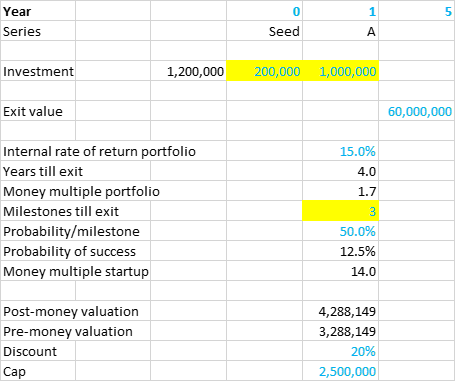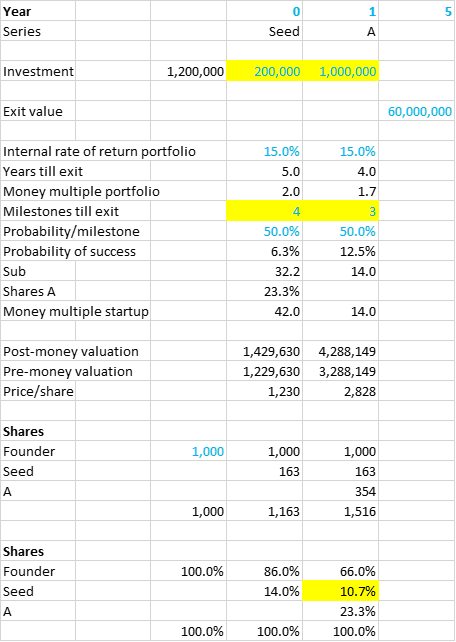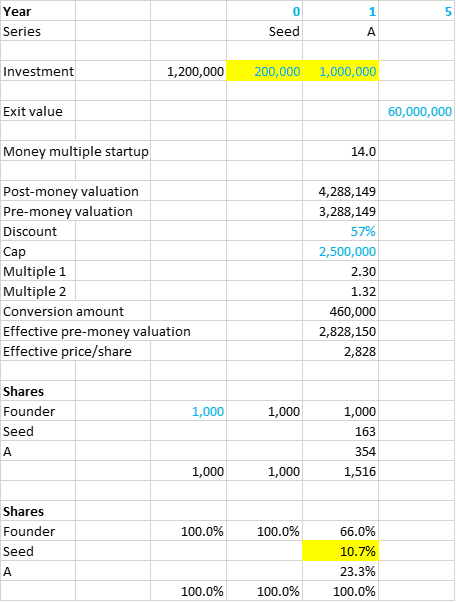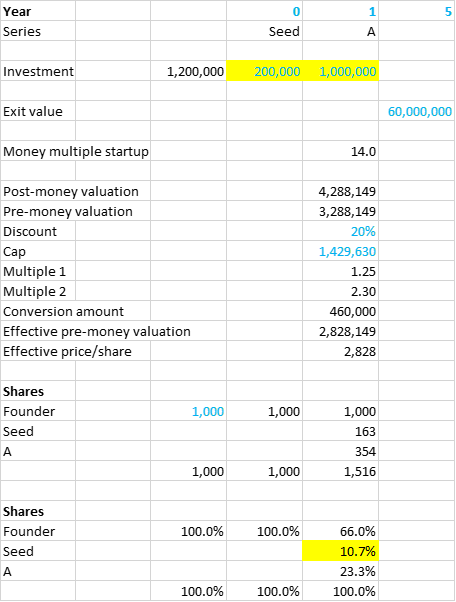Long story short: our guestpost writer Joachim Blazer thinks they are. Here’s why.
I just received an offer to invest in a convertible for a seed-stage startup.
Highlights: $200k loan, 5% interest, 3-year term, 20% discount and $2.5m cap.
So, market standard terms.
What is the deal with the convertible?


How much does the startup needs to raise in total? Assume $200k now for the first milestone/Series Seed and $1.0m in 1 year for the second milestone/Series A.
What is the exit value? Assume $60.0m in 5 years.
Series A
What internal rate of return does a Series-A investor want to make on his portfolio? Assume 15.0%.
When will the Series-A investor sell his shares? Assume after 4 years.
A 15.0% internal rate of return on his portfolio and 4 years till exit means the Series-A investor has to make a 1.7x money multiple on his portfolio.
How many milestones does the startup have to achieve between Series A and exit? Assume 3 milestones.
What is the probability of success per milestone? Assume 50.0%.
Three milestones with a 50.0% probability per milestone result in a 12.5% probability of success for the startup at the time they raise Series A.
A 1.7x money multiple and a 12.5% probability results in a 14.0x money multiple for the startup.
Series Seed
To simplify things I just look at the discount and cap I get on the convertible.
I can choose between:
A. 20% discount. That is the same as getting 1 / (1 – 20%) = 1.25x as many shares as the Series-A investor.
B. $2.5m valuation cap. At a $3.3m pre-money valuation for the Series A, that is the same as getting $3.3m / $2.5m = 1.32x as many shares as the Series-A investor.
I choose option B because that gives me the most shares.
So I convert $200k * 1.32 = $263k into shares.
Shares
A $60.0m exit value and a 14.0x money multiple result in a $4.3m post-money valuation.
A $4.3.m post-money valuation, $1.0m Series-A investment and $263k conversion amount result in an $3.0m effective pre-money valuation.
A $3.0m effective pre-money valuation and 1.000 shares outstanding before the Series A result in a $3,025 effective price per share.
The Series-A investor gets $1.0m / $3,025 = 331 shares (23.3%).
I get $263k / $3,025 = 87 shares (6.1%).
What is the equivalent regular share deal?
How many shares would I get if I invest $200k through a regular share deal?

Given the 42.0x money multiple that is required for this seed-stage investment, I end up with 10.7% of the shares.
Overvalued
With the convertible I get 6.1% of the shares.
The equivalent ordinary share deal gets me 10.7% of the shares.
That means this convertible is substantially overvalued.
The discount must be 57% instead of 20% before I would get proper value for money:

Or the cap must be $1.4m instead of $2.5m:

So, even though the terms are market standard, as an investor I pass on this convertible. I get far too little compensation for the risk I take.
As a cynical founder I would of course try to sell as many convertibles as possible at these terms.
TL;DR: Are convertibles overvalued? Absolutely.
 Joachim Blazer is a corporate finance advisor. He helps founders raise money. Contact him at hello@joachimblazer.com. The original article appeared on his blog first.
Joachim Blazer is a corporate finance advisor. He helps founders raise money. Contact him at hello@joachimblazer.com. The original article appeared on his blog first.
Main image: Pixabay

Given the assumption of an eventual exit, I understand the conclusion. However, is the risk profile that one faces with a convertible not different from an investment over the entire investment period where one does not know beforehand whether there will be an exit or not? If so than the overvaluation of the convertible would in essence be reflecting the relatively less risk exposure of the convertible compared to the investment, is it not?